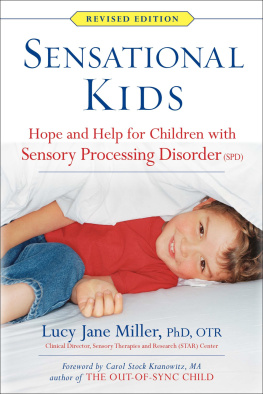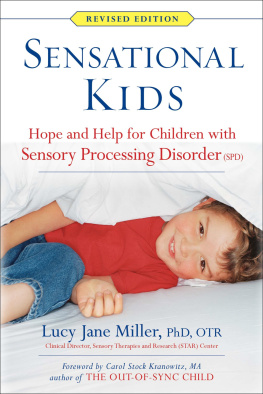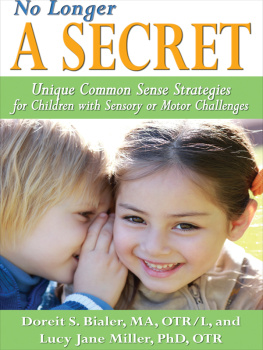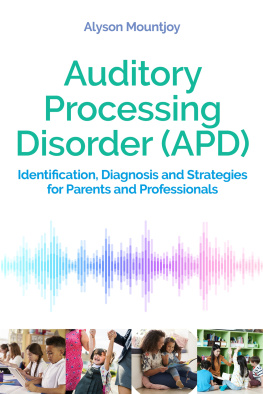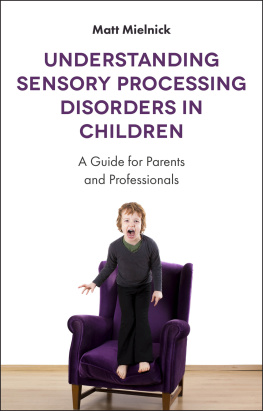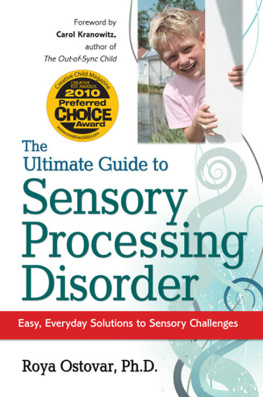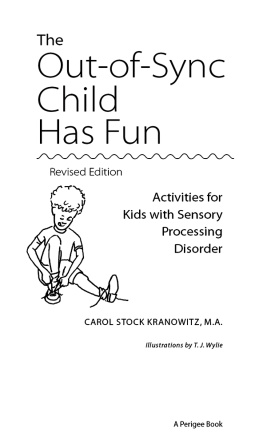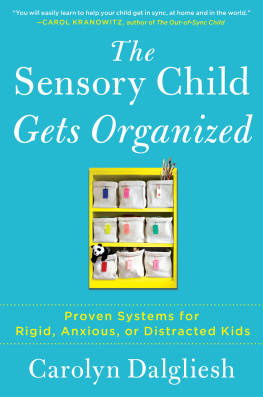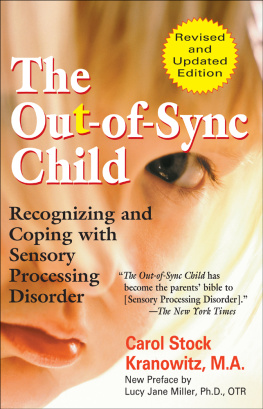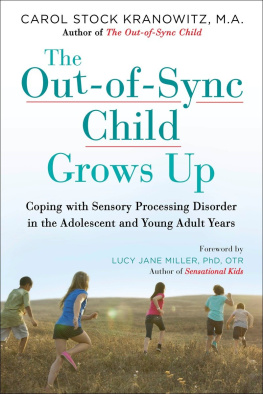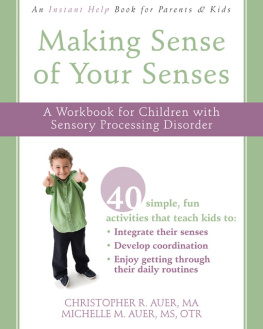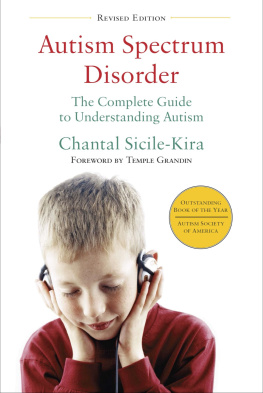A PERIGEE BOOK
Published by the Penguin Group
Penguin Group (USA) LLC
375 Hudson Street, New York, New York 10014

USA Canada UK Ireland Australia New Zealand India South Africa China
penguin.com
A Penguin Random House Company
Copyright 2014 by Lucy Jane Miller
Penguin supports copyright. Copyright fuels creativity, encourages diverse voices, promotes free speech, and creates a vibrant culture. Thank you for buying an authorized edition of this book and for complying with copyright laws by not reproducing, scanning, or distributing any part of it in any form without permission. You are supporting writers and allowing Penguin to continue to publish books for every reader.
PERIGEE is a registered trademark of Penguin Group (USA) LLC.
The P design is a trademark belonging to Penguin Group (USA) LLC.
Perigee trade paperback ISBN: 978-0-399-16782-9
The Library of Congress has cataloged the G. P. Putnams Sons hardcover edition as follows:
Miller, Lucy J.
Sensational kids : hope and help for children with sensory processing disorder / Lucy Jane Miller with Doris A. Fuller ; foreword by Carol Stock Kranowitz.
p. cm.
Includes bibliographical references and index.
ISBN 0-399-15337-3
eBook ISBN 978-1-101-20330-9
1. Sensory integration dysfunction in children. I. Fuller, Doris A. II. Title.
RJ496.S44M55 2006 2005056490
618.92'8dc22
PUBLISHING HISTORY
G. P. Putnams Sons hardcover edition / April 2006
Perigee trade paperback edition / January 2007
Perigee trade paperback revised edition / May 2014
Neither the publisher nor the author is engaged in rendering professional advice or services to the individual reader. The ideas, procedures, and suggestions contained in this book are not intended as a substitute for consulting with your physician. All matters regarding your health require medical supervision. Neither the author nor the publisher shall be liable or responsible for any loss or damage allegedly arising from any information or suggestion in this book.
While the author has made every effort to provide accurate telephone numbers, Internet addresses, and other contact information at the time of publication, neither the publisher nor the author assumes any responsibility for errors, or for changes that occur after publication. Further, the publisher does not have any control over and does not assume any responsibility for author or third-party websites or their content.
Version_2
TO MY COURAGEOUS and amazing parents, Edie and Marty, whose lives were an embodiment of Margaret Meads statement: Never doubt that a small group of thoughtful, committed citizens can change the world.... Indeed, its the only thing that ever has.
AND TO THE REST of my sensational family, whose support enables me to keep going: Bill, Coles, and Marita; Katy, Greg, Tasha, Alex, and Abby; Mike, Laura, Matt, Andy, Joey, and Jonny; Dan, Shell, Sarah, Ryan, and Jordan; and Phil, Phyllis, Barbara, and Karen.
AND MOST OF ALL toBMBB, who convinced me long ago that I could succeedand who still believes in me.
CONTENTS
FOREWORD
W hen Lucy Jane Miller and I first met at the 1998 American Occupational Therapy Association conference in Baltimore, I knew enough about her to be awed. As a preschool teacher, I was not in the field of occupational therapy but rather buzzed around it because of my interest in children with sensory problems. Of course, I knew Lucys nameher reputation was well established as an extraordinary occupational therapist, as a student of research pioneer A. Jean Ayres, and as the only full-time researcher focusing on sensory processing disorder (SPD). Nobody alive knew more about SPD than this small, beautiful, modest dynamo. To me, she was the Queen Bee. Meeting Lucy at the conference, I was introduced as the author of the just published The Out-of-Sync Child, the first book for parents about sensory processing disorder (then called sensory integration dysfunction). I felt awkward because I was aware that a book written by a layperson about a neurological disorder might not be accepted by professionals. I stood there, uncharacteristically speechless to be in the presence of one of my personal heroes.
But Lucy smiled at me kindly. Thank you so much for writing your book, she said. It is a huge contribution. Ill feature it on my website and recommend it to all the parents I see at the STAR Center, where were doing research with kids.
I was flattered beyond belief. Lucy Jane Miller liked my book! She liked it! Receiving her approbation was as good as it gets.
Within a few months, my book was flying off the shelves. Parent to parent and teacher to teacher, word got out that a book was available to answer basic questions about sensory processing problems. Frustrated parents and bewildered teachers deluged me with questions, such as, How can my kid be oversensitive to touch but undersensitive to movement? Can SPD be cured? Is there a medicine to fix it? What will become of my child as a teenager and adult? How can I include this child in my classroom? Who is the go-to person for this disorder?
To answer such questions, I put together an FAQ letter that included information about the SPD Foundation, which focuses on advocacy, education, research, and parent support, as well as Lucys new STAR Center, where intervention for children and adults occurs. Although I was reluctant to impose on her jam-packed schedule, I realized that I needed more of her expertise. One afternoon, I took a deep breath and called her up.
When Lucy answered the phone, I reintroduced myself. Carol, she said, How did you know I would be home? I just ran back for something. Im never home during the day! I dont even have an answering machine on this telephone, so I would have missed your call altogether.
The timing was magic, we agreed. She gave me the information I needed for my FAQ letter and much more. We talked for almost an hour about her research, her quest for funding to support studies of sensational kids, her compassion for struggling families, and her goal to promote awareness of SPD. I told her about my zeal to get out there and spread the word. She said, Once the dream begins, you just have to pursue it, right?
Thus, our friendship began.
Meanwhile, I had entered the lecture circuit, speaking about the basics of SPD and demonstrating strategies for young children that I had developed as a teacher. Wherever I appeared, parents and professionals besieged me with questions, and I, in turn, besieged Lucy for answers.
Via telephone and email, she supplied them. Patiently, she provided meticulous definitions and explained complicated concepts. Generously, she gave me her time and attention. I wanted to understand SPD, and Lucy knew that I needed to understand it better so I could teach parents, teachers, and others when I lectured. We were in sync, committed to the same cause. Lucy became my private partner on the lecture circuit, tirelessly answering my never-ending questions and always at my side in spirit, if not in fact.
As interest in SPD blossomed around the country, I urged Lucy to lecture with me. I knew audiences would benefit tremendously if we were public as well as private presentation partners. At first, she declined, saying, The most important contribution I can make is to learn what causes the disorder and how to best treat the symptoms. I need to stay focused on advancing the research for this to happen. If I start speaking at conferences, Im afraid it will take me away from finding the answers that are central to helping these kids.

